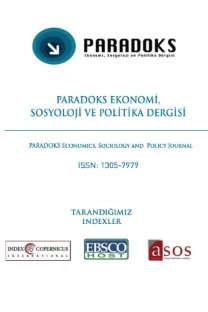Sosyal Politika, Neoliberal Ekonomi Politikaları ve Ulus Devletin Ekonomi Politiği
19. yüzyıl, sosyal politika açısından önemli gelişmelerin yaşandığı bir yüzyıl olarak değerlendirilmektedir. Bu yüzyılda ekonomik ve sosyal yapıda ortaya çıkan değişmeler sosyal politikanın gelişiminde önemli bir rol oynamıştır. Ancak 20 yüzyıla girerken ortaya çıkan küreselleşme süreci ulus devletin sosyal politika insiyatifini önemli ölçüde etkilemiştir. Ortaya çıkan küresel anlayış ulus devletlerin sosyal sorunlara müdahalesini öngörmediği gibi sosyal politikalarda bir geri dönüşü de talep etmektedir. Bu konudaki genel eğilim içinde yaşadığımız küresel toplum anlayışının, ulusal ve uluslararası gerçeklere olan dikkati saptırırken küreselleşmenin ulus devleti sosyal politikalarını önemli ölçüde zayıflattığı yönündedir.
Anahtar Kelimeler:
Küreselleşme, Sosyal Politika, Ulus Devlet, Ekonomi Politik
Social Policy, Neoliberal Economy Policies and Economy Politic Of Nation State
19th century, called “nation state age”, is a period that important developments happened. The changes happened in economic and thus social structure in that century, such as collection of production means and capital in certain groups, appearing of new worker groups and the possibility of capital owners to exploit them because they are weak economically, are the characteristics of the countries beginning to industrialize. Also, a high degree of standardization became the most appearing characteristic of production and human needs began to be met by production of consumption goods in general and certain types. That development naturally eliminated the personal element in economic relations and the conditions both in commodity and labour markets began to be determined by just employee and employer. Until now, the national state has been providing those needs but globalization demand has challenged that order. Because global mentality doesn’t accept neither intervention of national states into social problems nor going back to the old social policy implementations.
Keywords:
Globalisation, nation state, social policy, economy-politic,
- ISSN: 1305-7979
- Yayın Aralığı: Yılda 2 Sayı
- Başlangıç: 2005
- Yayıncı: Sema AY
Sayıdaki Diğer Makaleler
İktisadi Kalkınma ve Bölgesel Eşitsizlikler: Türkiye Üzerine Bir Uygulama, 1965-2001
Arş.gör. F.merve PARLAKYILDIZ, Yrd.Doç.Dr. Okyay UÇAN
Müzakereci Demokrasilerde Sivil Toplum Kuruluşlarının Rolü
Arş.Gör. Sefa USTA, Öğr.Gör.Dr. Abdülvahap AKINCI
Türev Ürün Kullanımının Kamu ve Özel Sektör Bankalarının Finansal Performansları Üzerindeki Etkisi
A Socio-Economic Survey on Gypsies in Kocaeli, Turkey
Prof.dr. Yılmaz BİNGÖL, Yrd.doç.dr. Tahir BÜYÜKAKIN
Sosyal Politika, Neoliberal Ekonomi Politikaları ve Ulus Devletin Ekonomi Politiği
Atık Ticareti ve Tehlikeli Atıkların Sınıtötesi Taşınımına İlişkin Hukuki Düzenlemlerin Etkinliği
